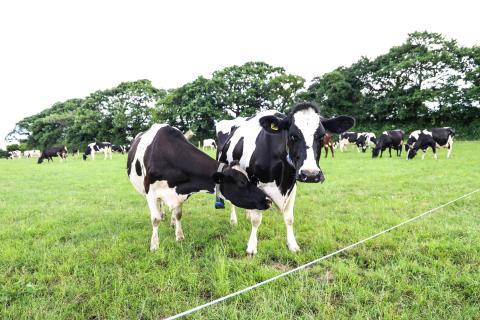06 November 2023
A Flintshire dairy farm expects to further cut antibiotics usage in its block-calving dairy herd by using an innovative technique that links individual cow DNA to her somatic cell count (SCC) level in a bulk milk sample.
Moor Farm, near Holywell, a member of the Farming Connect ‘Our Farms’ network, avoids using antibiotics unless really necessary.
Antibiotics are no longer routinely used for dry cows – sealant only is used on any cows that have a SCC of under 250,000 cells in the run-up to drying off.
Cows with higher readings, those that have experienced a SCC spike in the previous three months or an animal that has had a case of clinical mastitis are individually assessed to establish a need for antibiotics or not.
This has reduced antibiotic usage to 5.06mg/population corrected unit (PCU).
For Rhys Davies and his parents, Dei and Heulwen, the ambition is to cut treatments further, by utilising a technique linked to genomic testing.
The Davies’ have been genomic testing their heifer calves at two weeks old since 2014, using the Herd Genetic Report available from AHDB Dairy and ranking them for protein percentage, fertility index, maintenance and mastitis.
As a Farming Connect ‘Our Farms’ project, they are advancing this further, linking genomic testing to GenoCells, a new generation milk testing technique that provides individual cow SCCs using a single bulk milk sample.
GenoCells uses each cow’s genomic profile to identify SCC contribution to avoid the requirement for time-consuming individual cow milk sampling, Rhys explains.
As all his herd is genomically tested, he is eager to see how accurate testing bulk milk tank samples can be at identifying individual cow SCCs in the herd compared to traditional milk recording methods.
He hopes it will enable him to quickly identify offending cows following any high SCC results picked up during regular testing.
“We hope it will allow us to make more accurate decisions when we dry off,’’ says Rhys, who calves the herd over eight weeks from 15 March.
“We can sample weekly post-calving to catch any cows that have been infected in the dry cow period, and that might only require the use of anti-inflammatories, not antibiotics.’’
For some herds it will avoid requirement of time-consuming individual cow milk sampling.
Rhys believes this will be appealing for low input systems that don’t focus on milk recording for yield, as well as dairy farmers in general as it could enable them to identify sub-clinical mastitis, improve milk quality, reduce antibiotic use and facilitate a selective dry cow therapy programme.
The Moor Farm project results will be shared with the wider industry, one of the principals aims of the Our Farms network.
“GenoCells is a very new technology, I don’t know of another farmer who has yet used it, so it is very forward-thinking of Farming Connect to trial it as one of our Our Farms projects,’’ said Rhys.
“The results could have a very important bearing on our antibiotic usage going forward, and for other dairy farms in Wales too.’’

